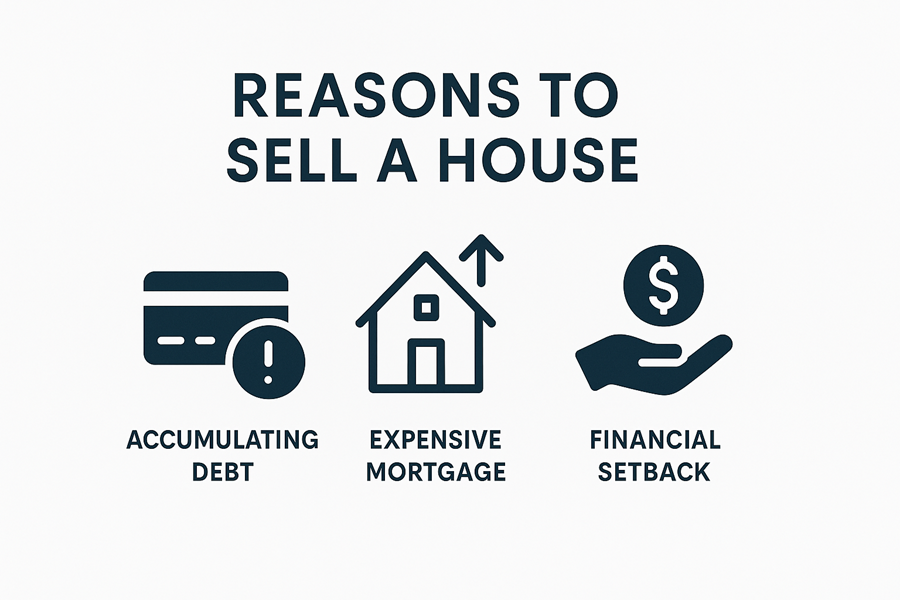Should I sell my house? 3 signs to know its the right time
Decide if it's the right time to sell your house by assessing your equity, debt, and mortgage costs. Learn how to make informed decisions and explore leaseback options.

Key takeaways
- Know your equity before making a decision.
- Sell if debt is piling up and you are falling behind.
- High mortgage costs can signal it is time to move.
- Selling can be smarter than taking on more loans.
Let’s be clear from the start: selling your house is a major decision—and not one you should take lightly.
You have likely spent years investing in your property. Whether it has gained value or not, it is still a deeply emotional investment.
At Leaseback, we believe you should not sell your home, unless you fall into one of three clear scenarios.

But First, Make Sure You Have Equity
Before we jump into the signs, here’s an absolute must: you need to have equity. You can calculate your home equity with this simple formula:
Equity = Market Value of Your Home – Mortgage Balance
To get a realistic estimate of your home's value in today's market, we recommend subtracting 20% from the current market estimate to account for price corrections.
1. You’re Struggling With Credit Card Debt
If your credit card balances keep climbing, and you are only making minimum payments while interest keeps compounding, you may be headed toward foreclosure or bankruptcy.
These outcomes can wreck your credit score and limit your ability to secure future loans with favorable interest rates. Worse, your lender could end up selling your home for less than it’s worth—sometimes just 50 cents on the dollar.
If you are in this situation, selling your house—or another major asset—is not just a smart idea, it’s something you should seriously consider doing soon.
2. Your Mortgage Is Too Expensive
Mortgage rates are still elevated. As of April 2024, the average mortgage interest rate sits around 6.88%, and the average monthly mortgage payment is approximately $2,700—not including other housing expenses.
Now, add in:
- Property taxes
- HOA fees
- Insurance and repairs
If your total housing costs exceed 25% of your monthly income, then you may be house-poor. Downsizing or transitioning into a rental can be a smart financial reset.
Source: Bankrate’s mortgage analysis
3. You’ve Had a Major Financial Setback
Life happens. Job losses, unexpected medical bills, and other financial curveballs can shake up your budget. While some homeowners consider HELOCs (home equity lines of credit) or personal loans, those can carry long-term risk—and potentially lead to bankruptcy.
Instead, it may be smarter to leverage the equity you’ve built in your home to cover short-term challenges. Selling now might save you from worse outcomes later.
Bonus: Want to Sell but Stay in Your Home?
If you relate to any of the above situations—but dread the stress of moving—we have a solution made for you.
With the leaseback option, you can sell your house, use the proceeds to solve financial challenges, and stay in your home as a renter. This means:
- No need to uproot your family
- Cash in your hands quickly
- Time to recover without changing your environment
Want to Sell Fast And Quick
If you’re looking to sell quickly and as-is, we can connect you with trusted leaseback partners who can help. Through their Sell and Stay programs, you could sell your home in as little as 15 days, receive your cash upfront, and continue living there as a renter for as long as you need.
Check out you options here:
Explore Leaseback Insights
Discover the benefits of leasebacks for investors.

Struggling with Debt? Here’s How to Tap into Your Home Equity and Stay Put

Understanding Reverse Mortgages: What They Are and How They Work

Trying to sell your home fast? Pricing it too high may backfire
FAQs
Discover answers to common questions about our leaseback services and how we can assist you.
What is a leaseback?
A leaseback is a financial transaction where the seller of an asset leases it back from the buyer. This arrangement allows the seller to retain usage of the asset while freeing up capital. It's commonly used in real estate and business assets.
How does it work?
In a leaseback, the seller sells the asset and immediately signs a lease agreement to rent it back. This provides liquidity to the seller while allowing them to continue using the asset. The terms of the lease, including duration and payment, are negotiated at the time of sale.
Who can benefit?
Businesses looking to improve cash flow can benefit significantly from leasebacks. It allows them to access capital while maintaining operational control over their assets. Additionally, investors seeking stable returns may find leaseback agreements appealing.
Are there risks involved?
Yes, there are risks associated with leasebacks, such as potential loss of asset ownership. If the lessee fails to meet lease obligations, they may lose access to the asset. It's essential to carefully evaluate the terms and conditions before entering a leaseback agreement.
How to get started?
To get started with a leaseback, contact us for a consultation. Our team will guide you through the process and help you understand your options. We'll work together to find a solution that meets your financial needs.

